
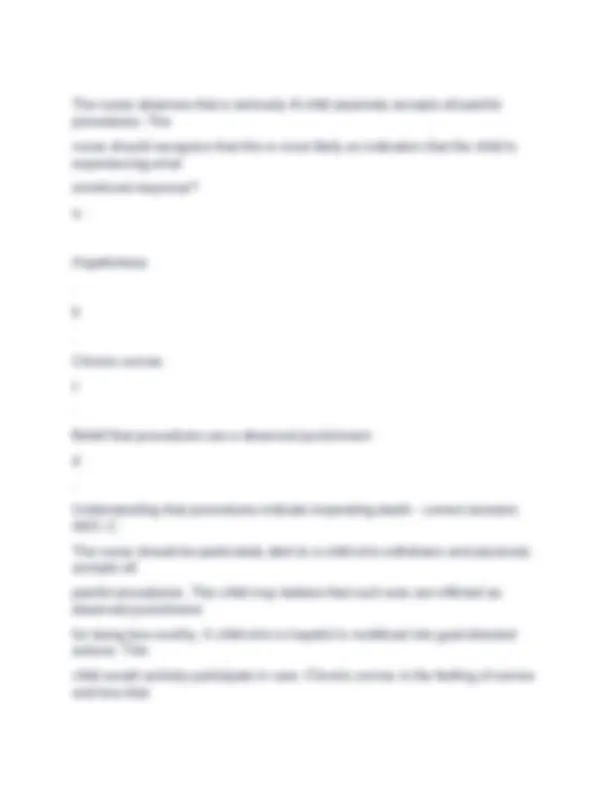





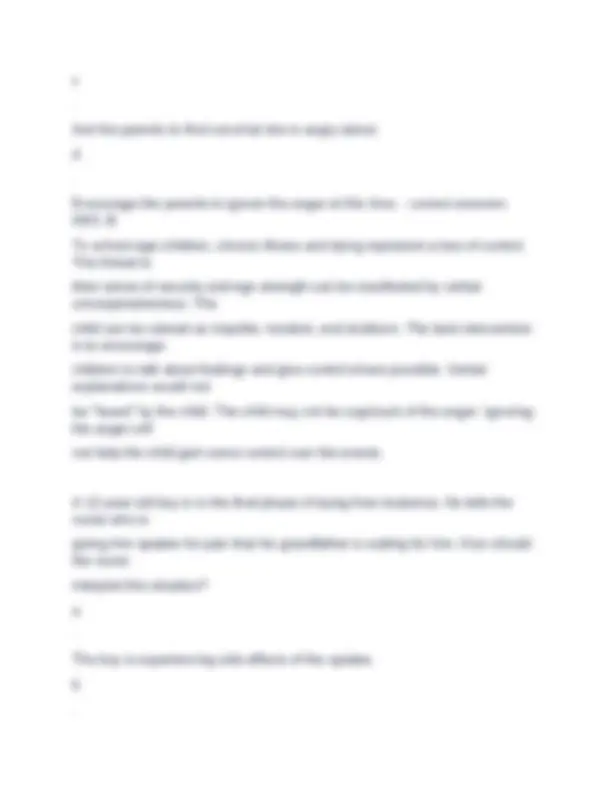


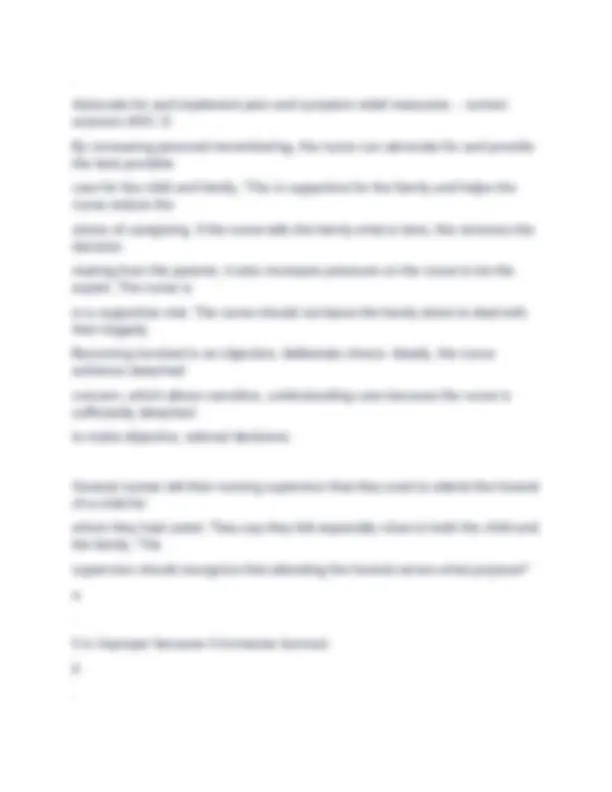


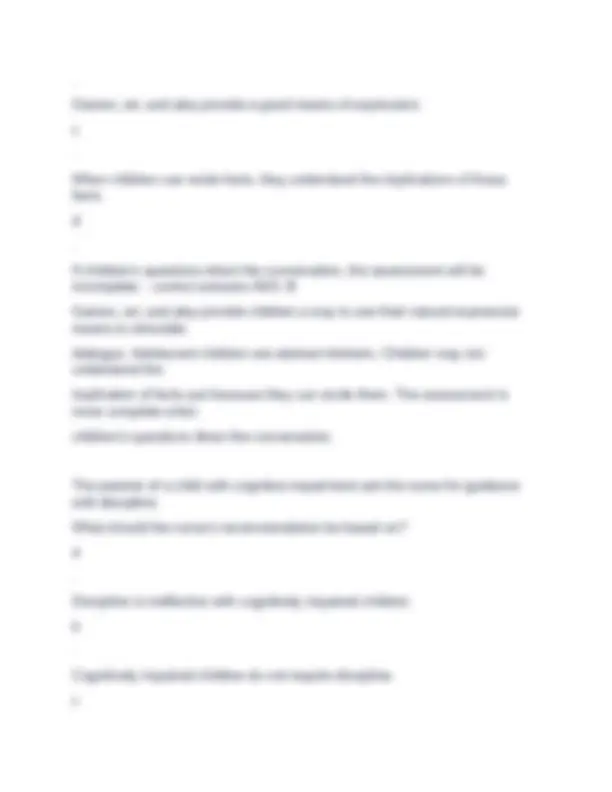
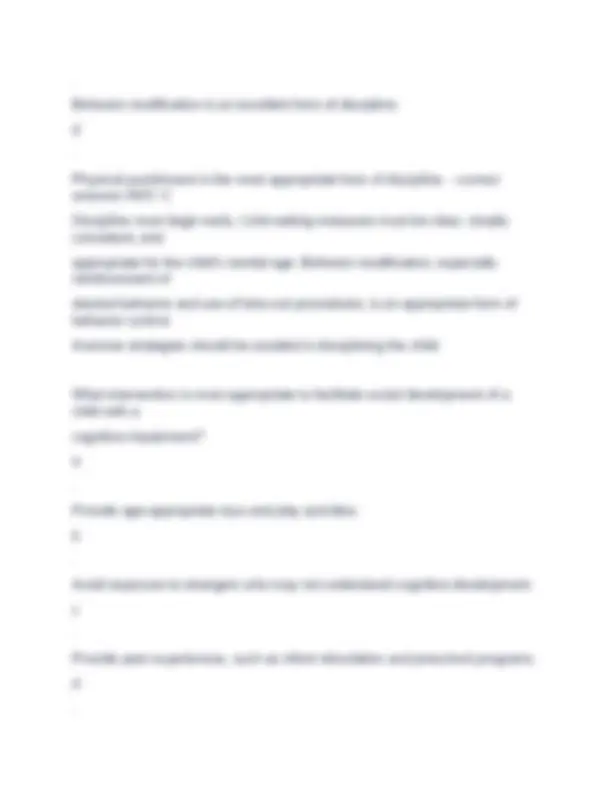
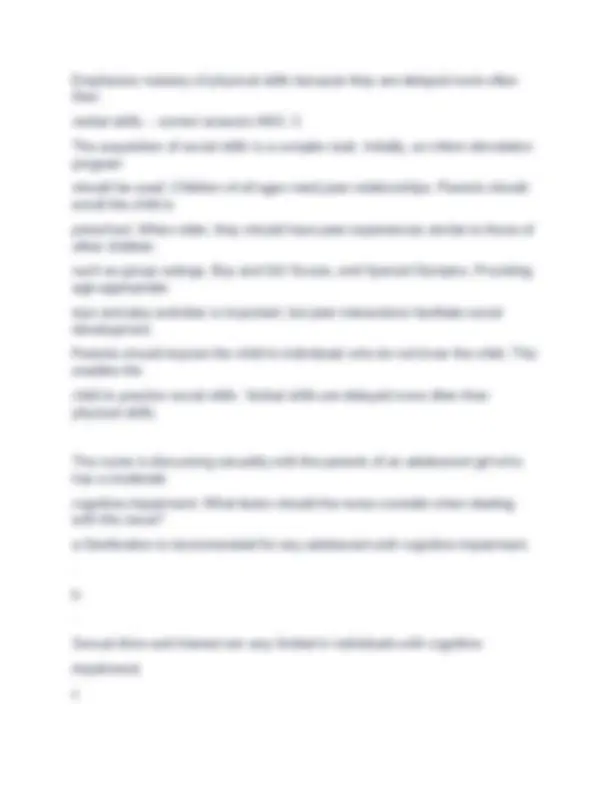
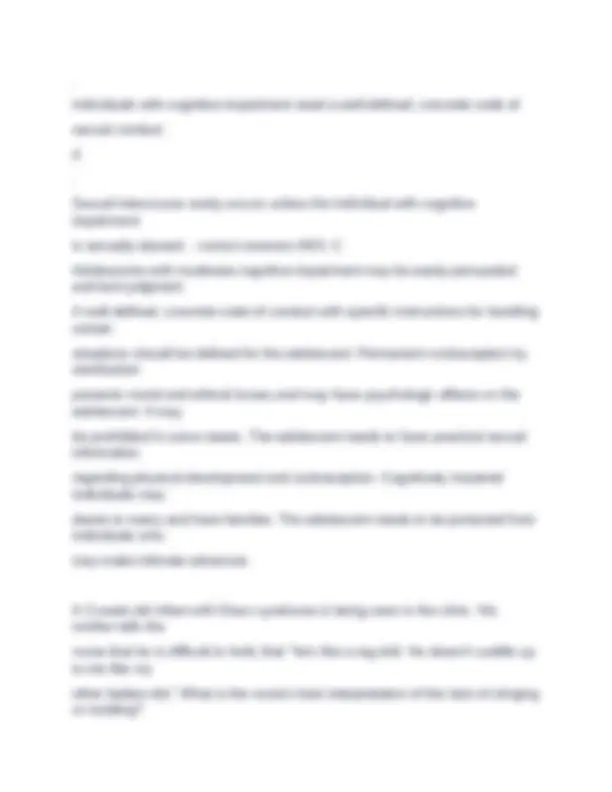
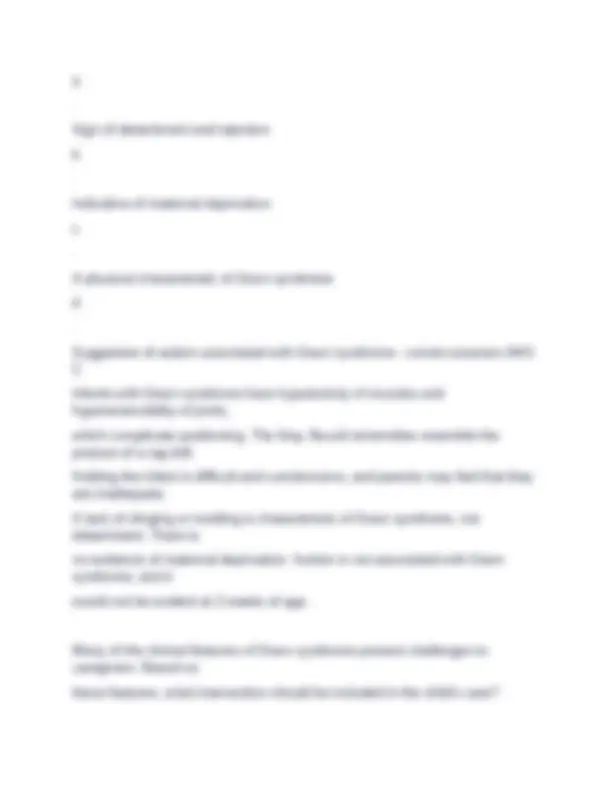
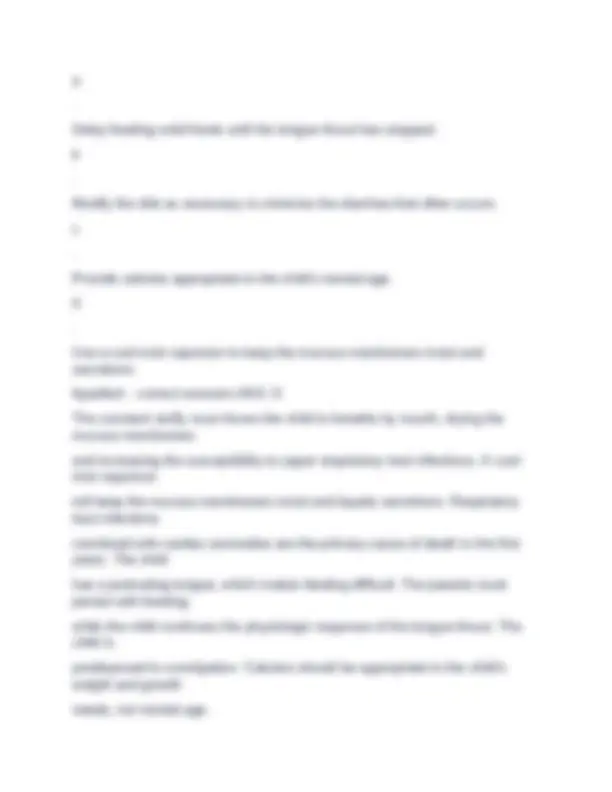
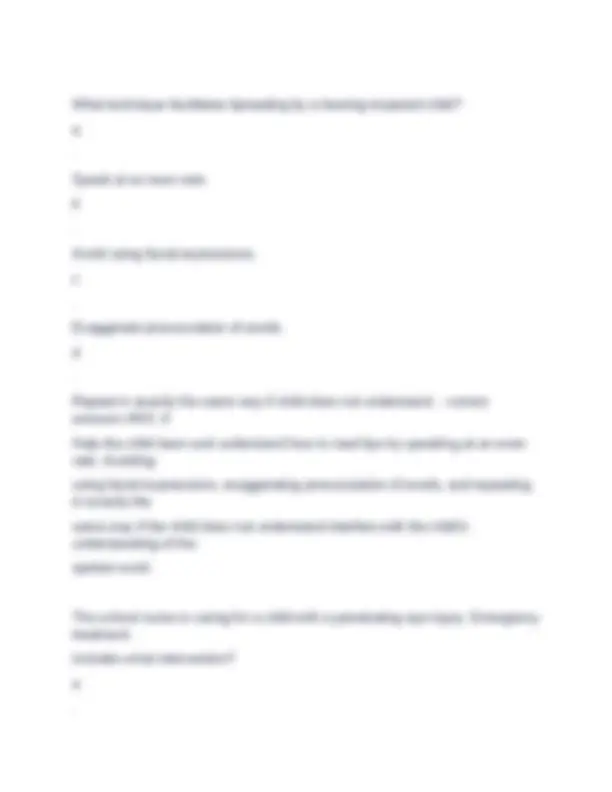


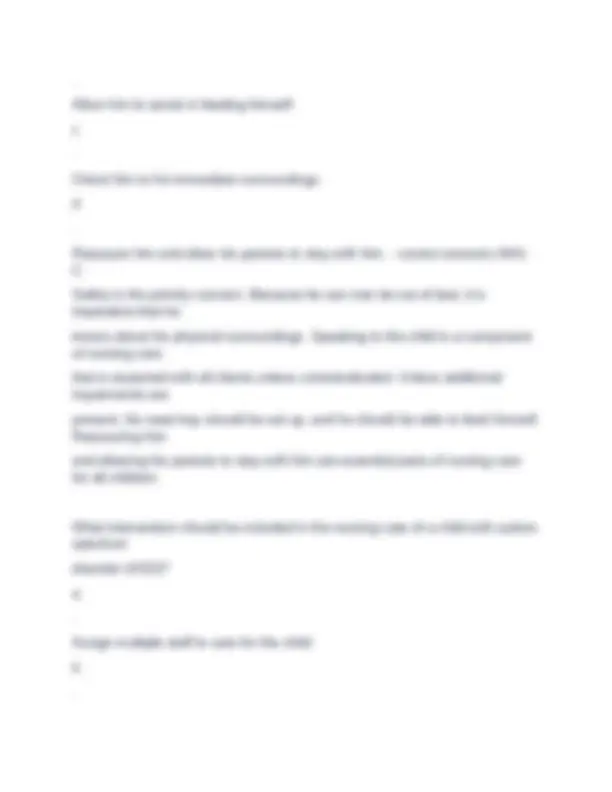

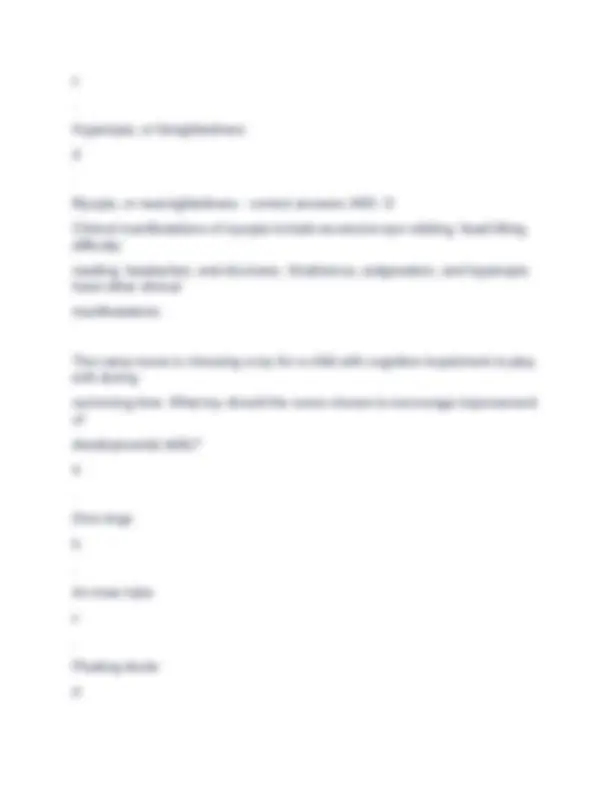
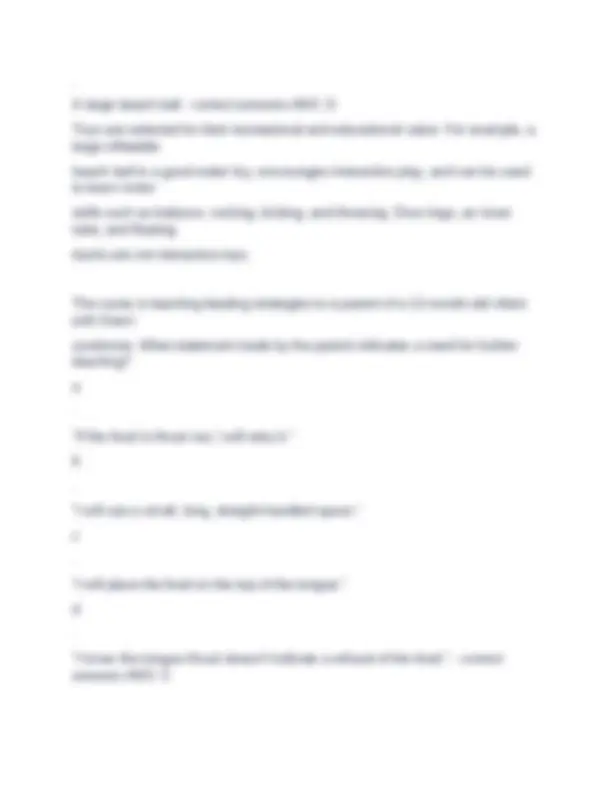
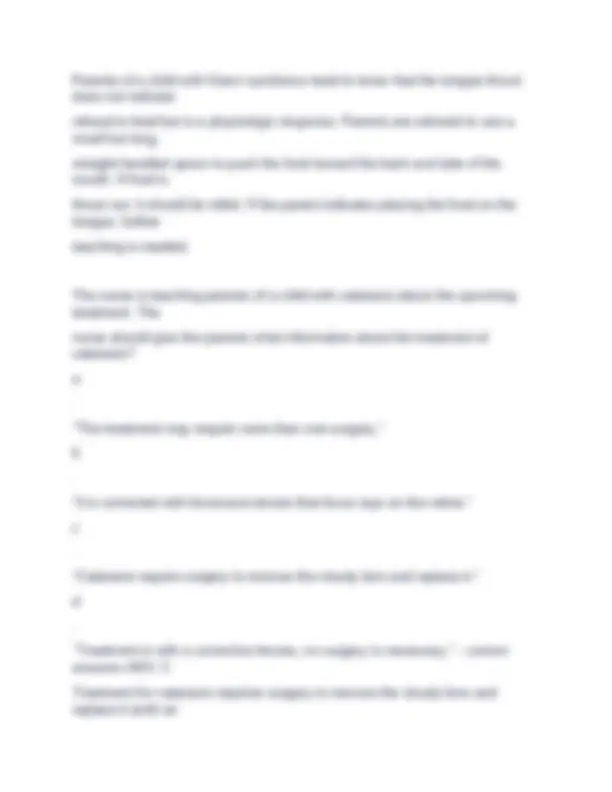



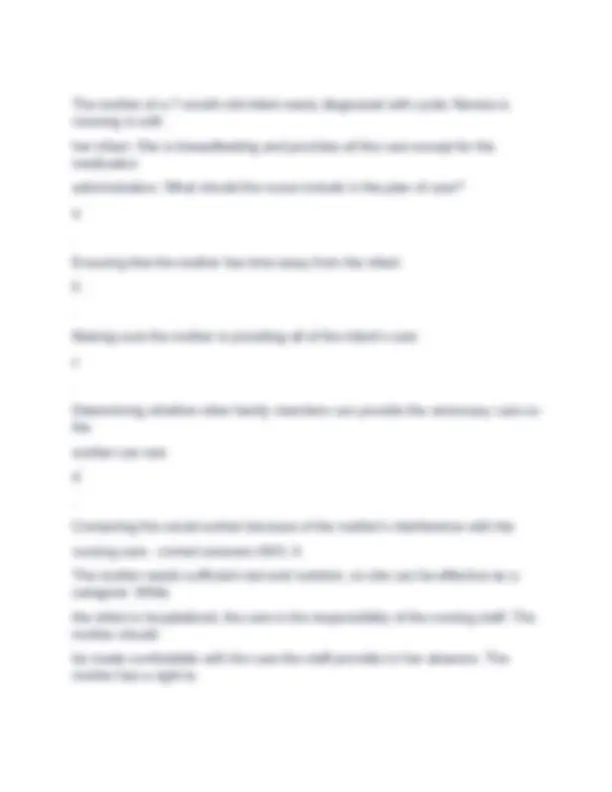
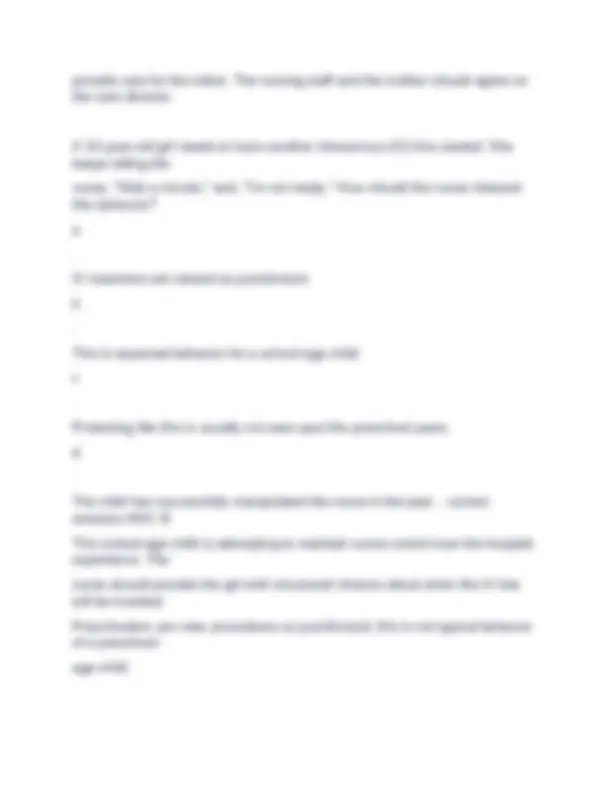
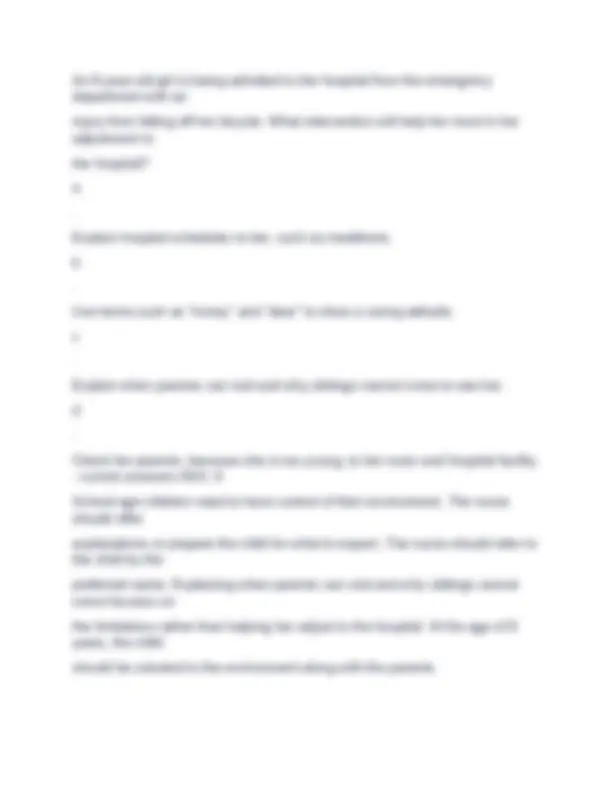
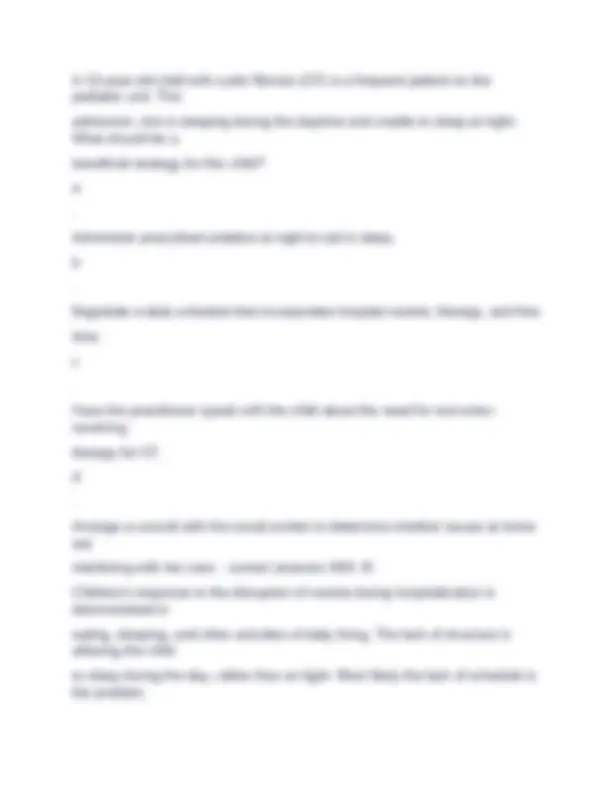


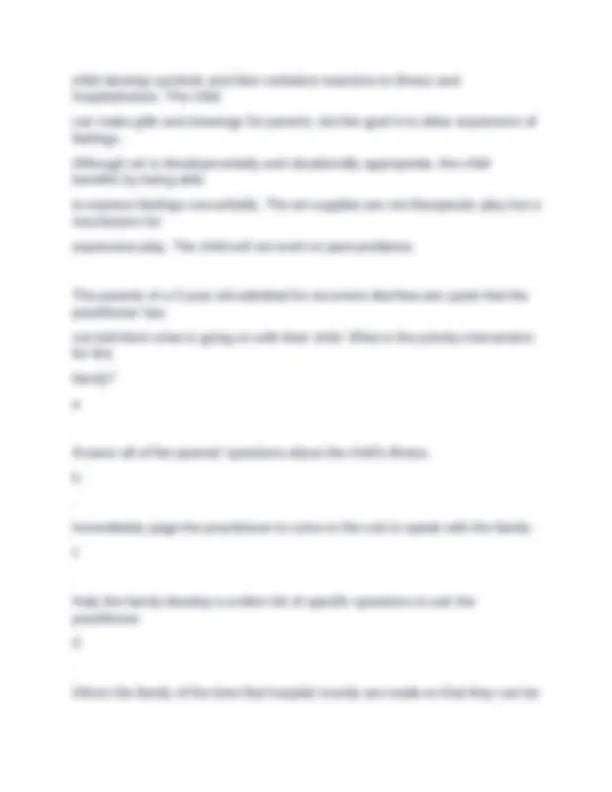

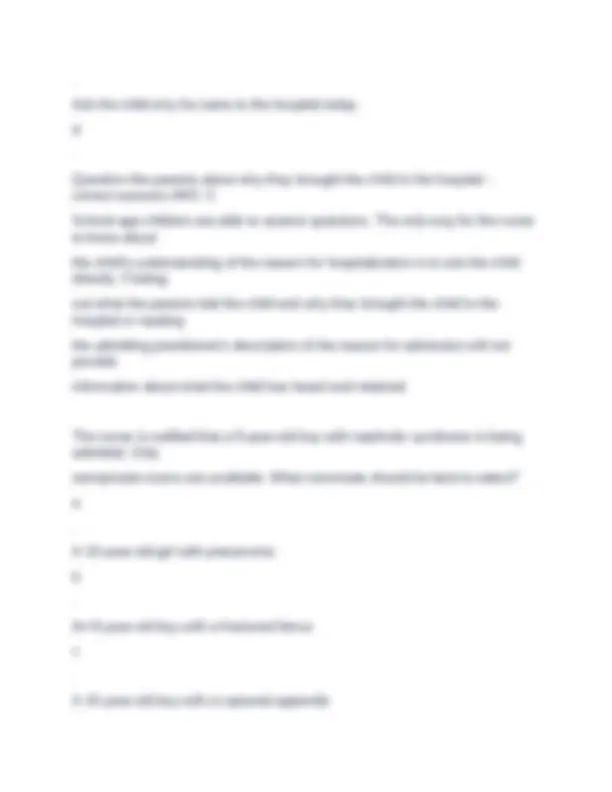

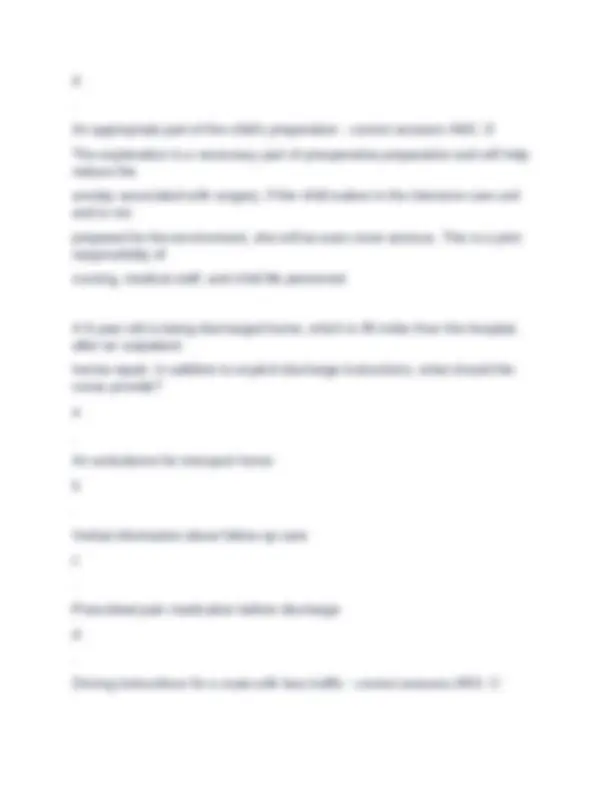

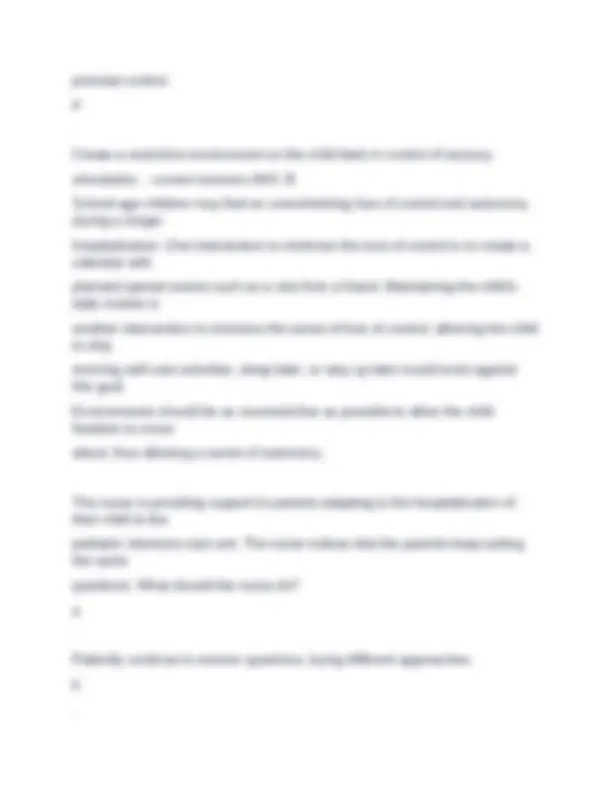
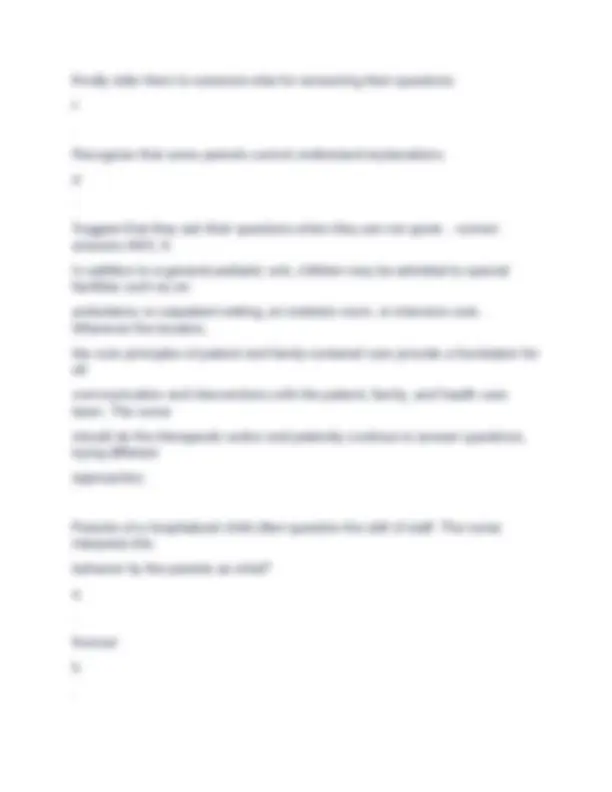
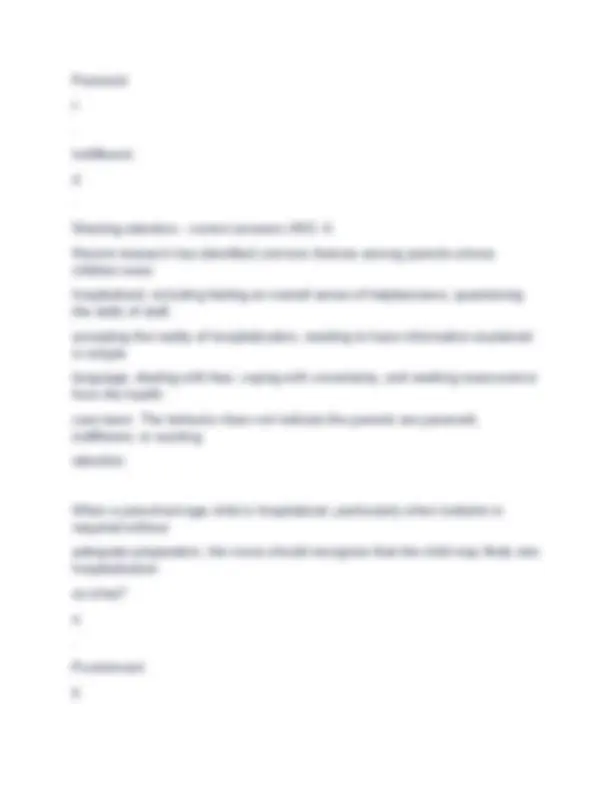
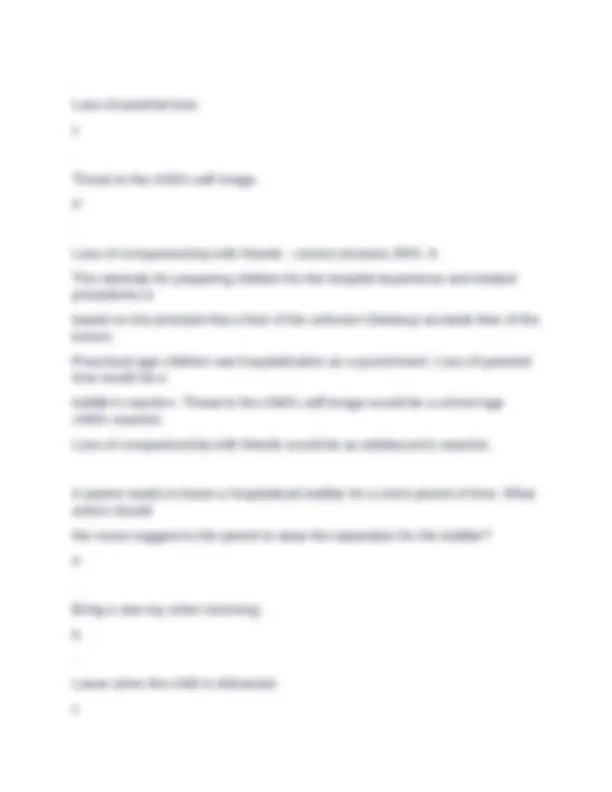
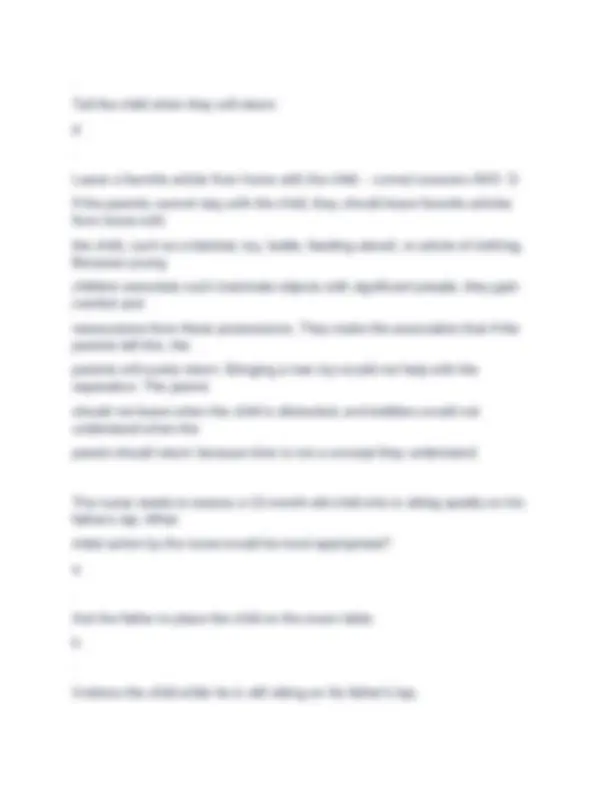
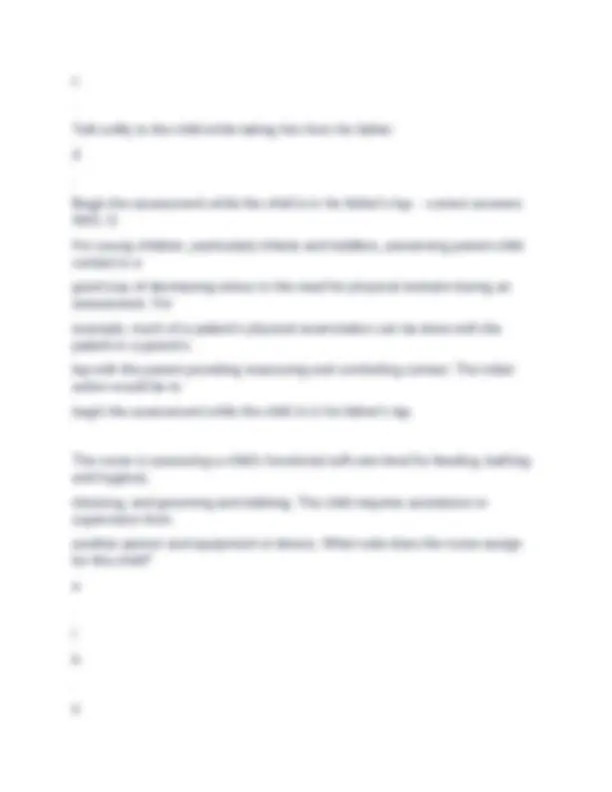
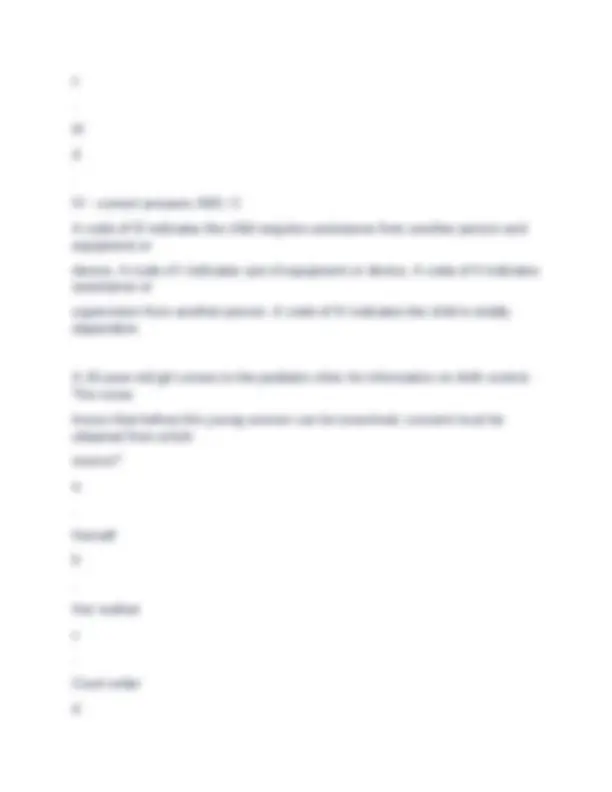
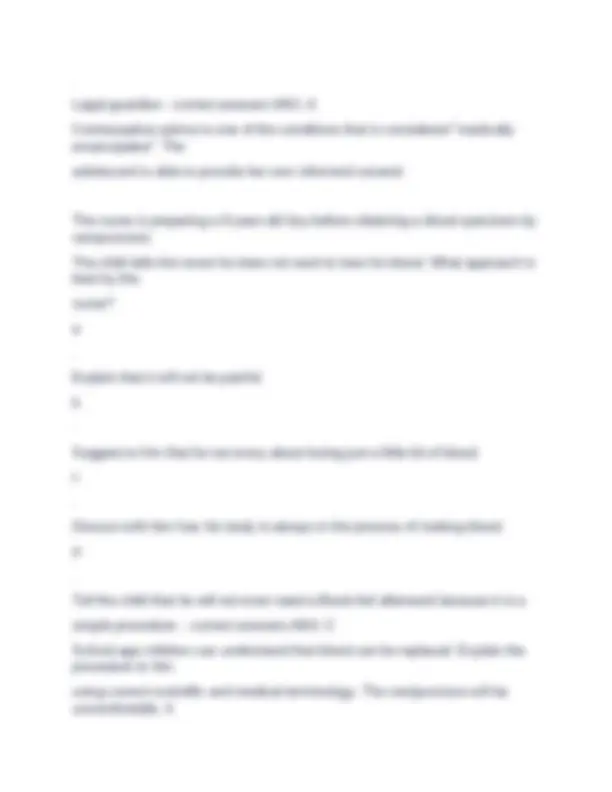

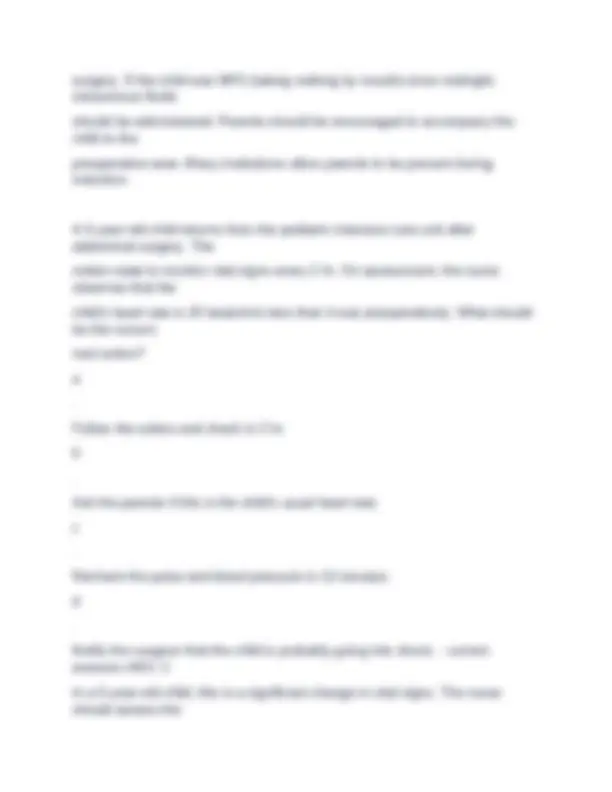

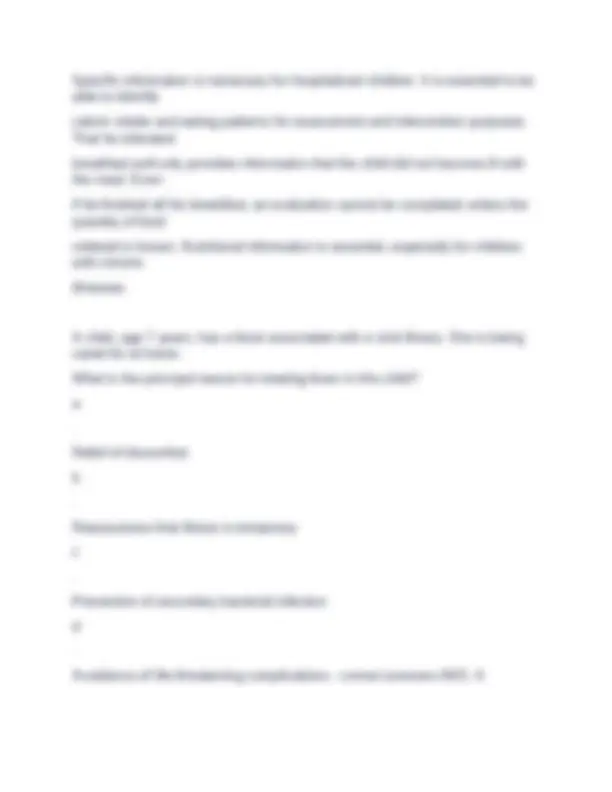

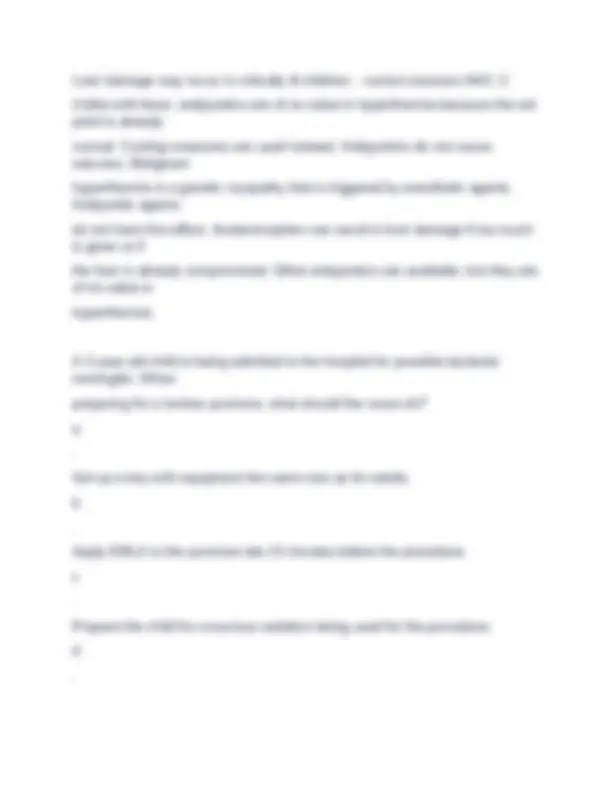
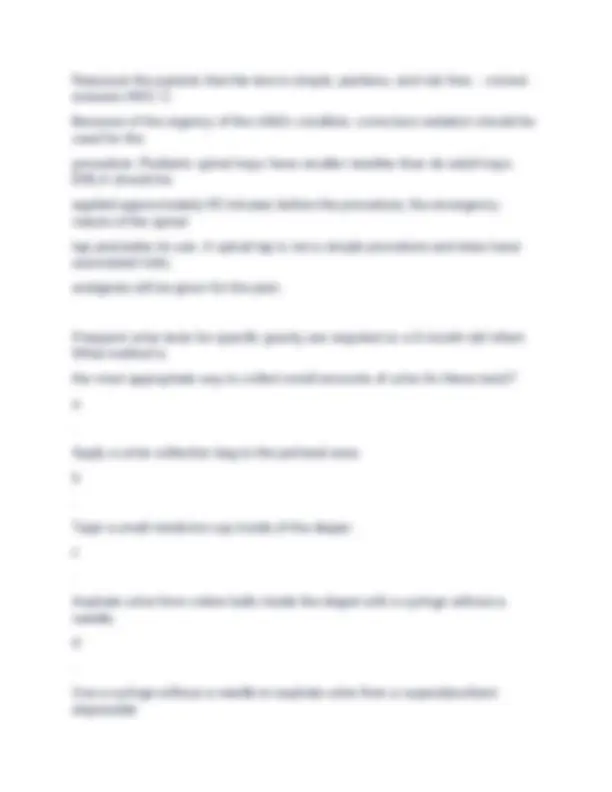
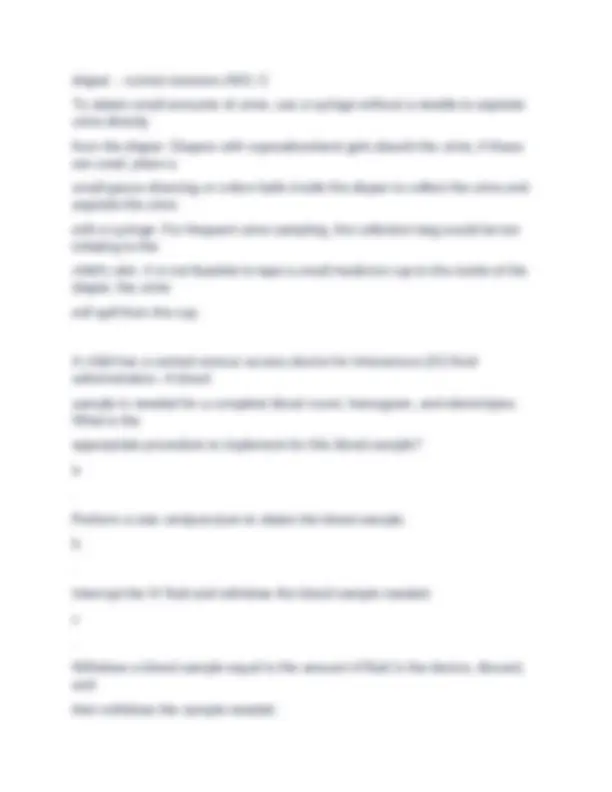
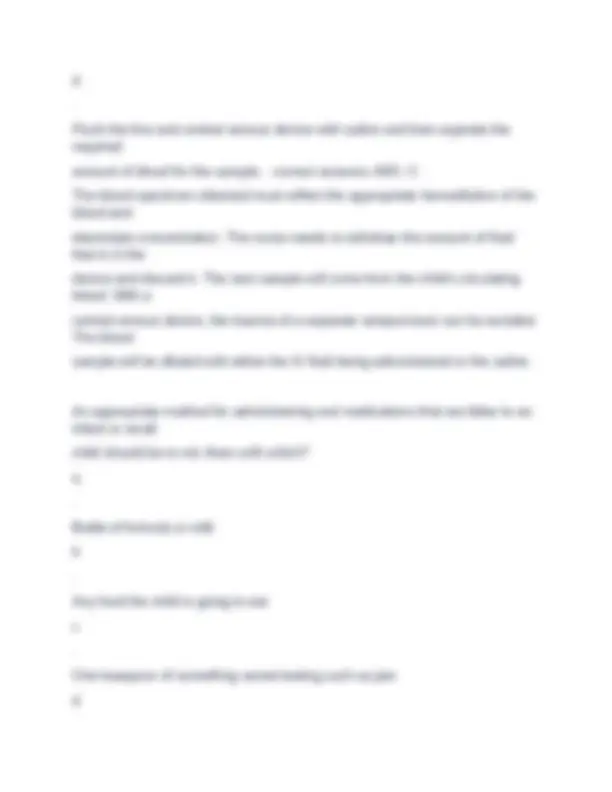
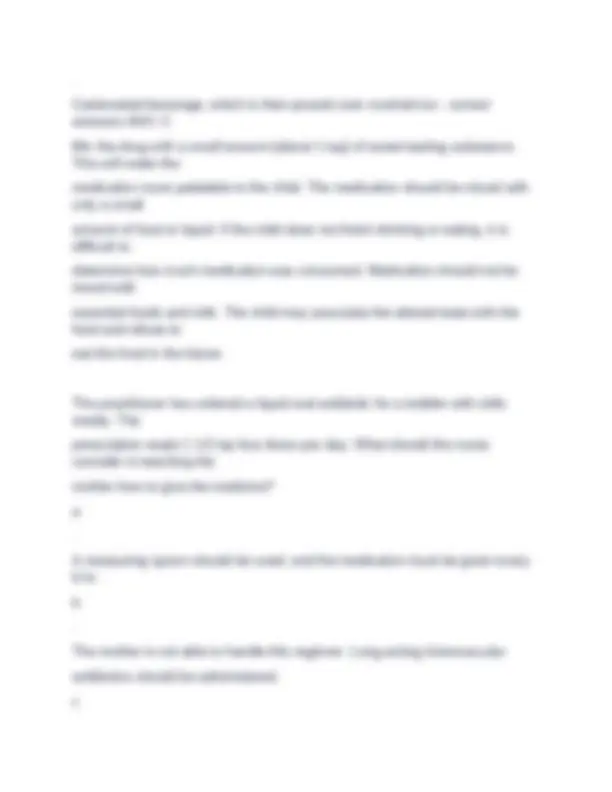

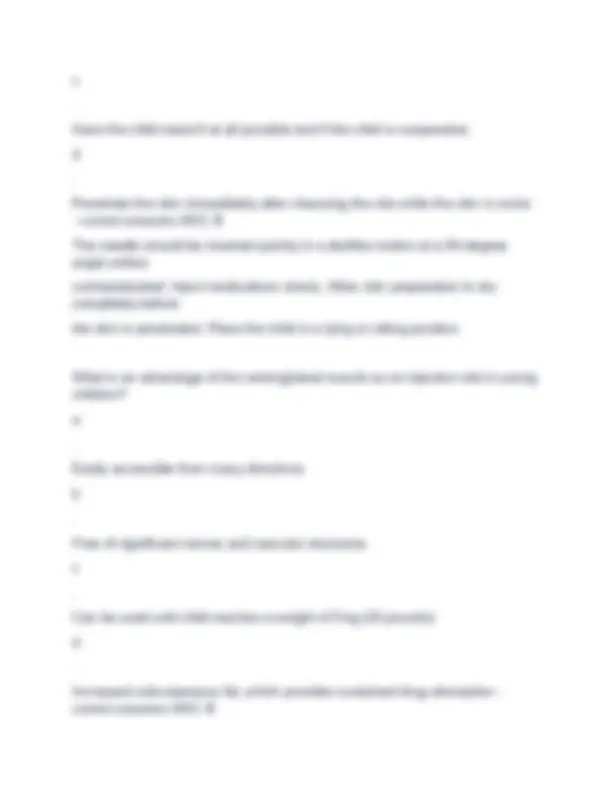
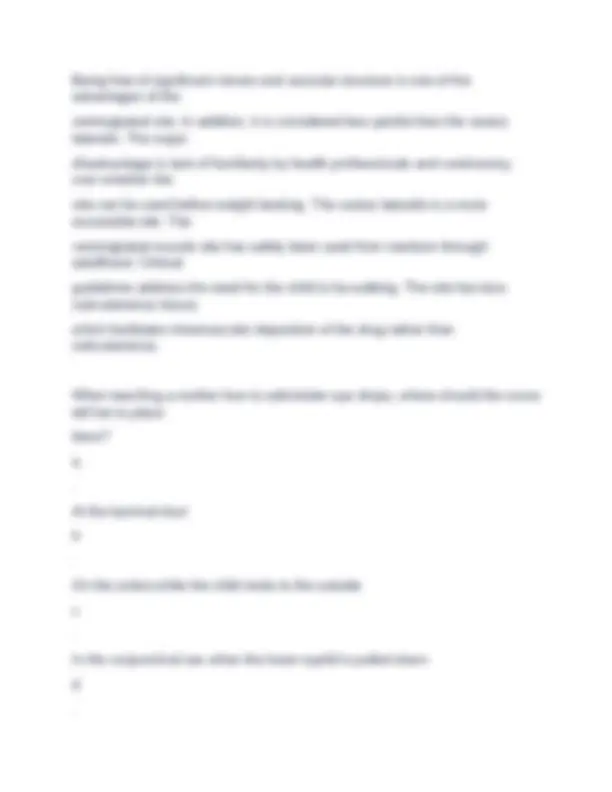

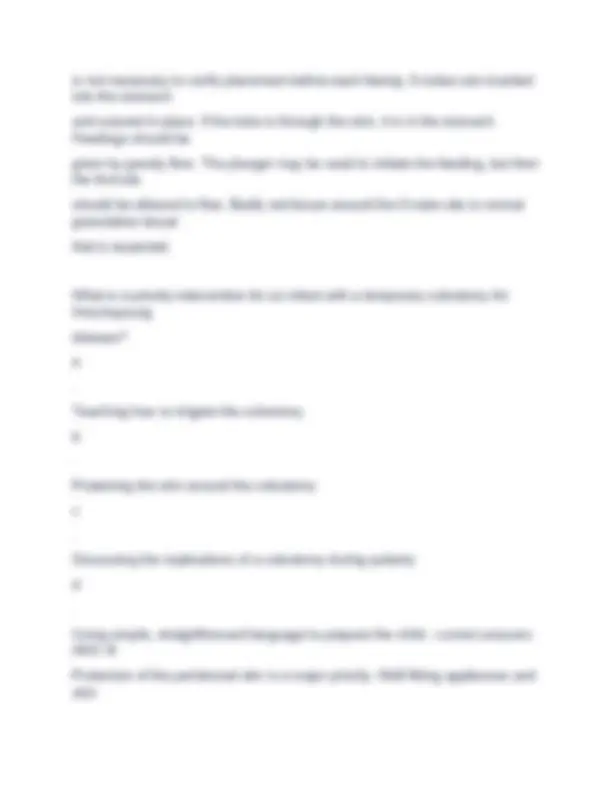


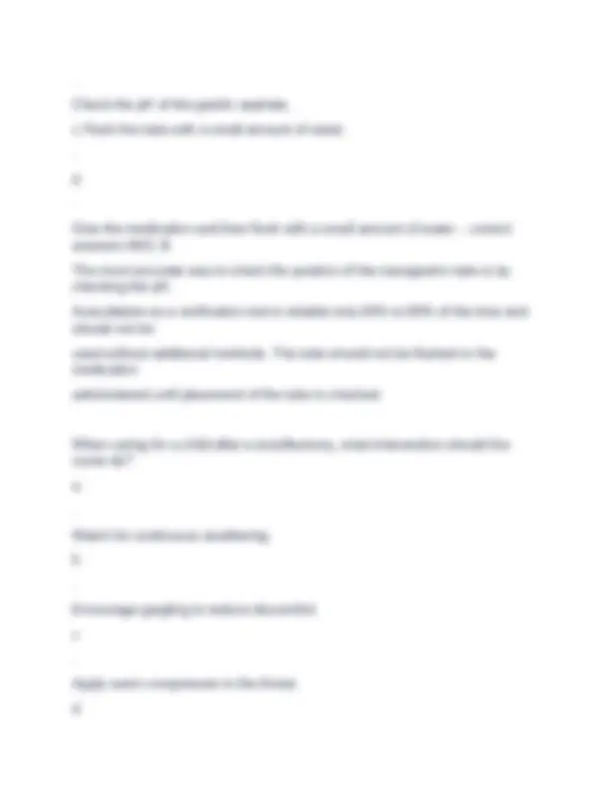
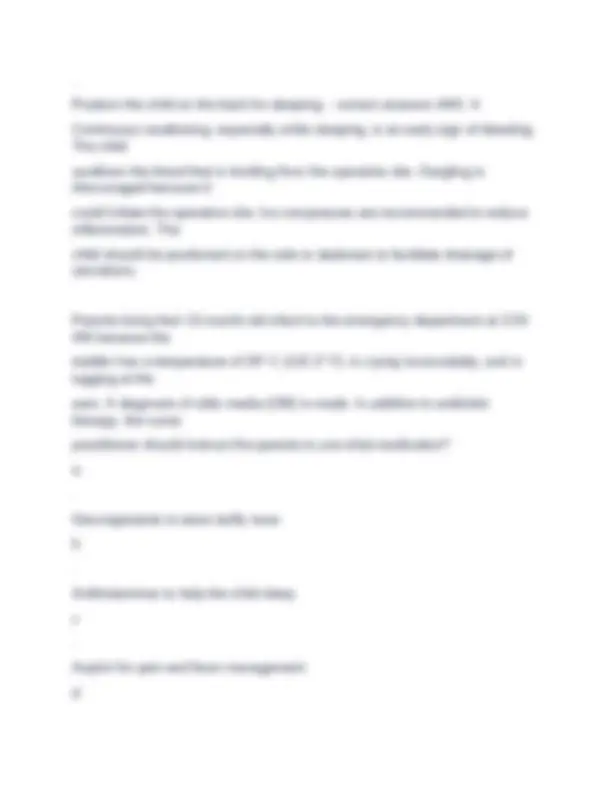
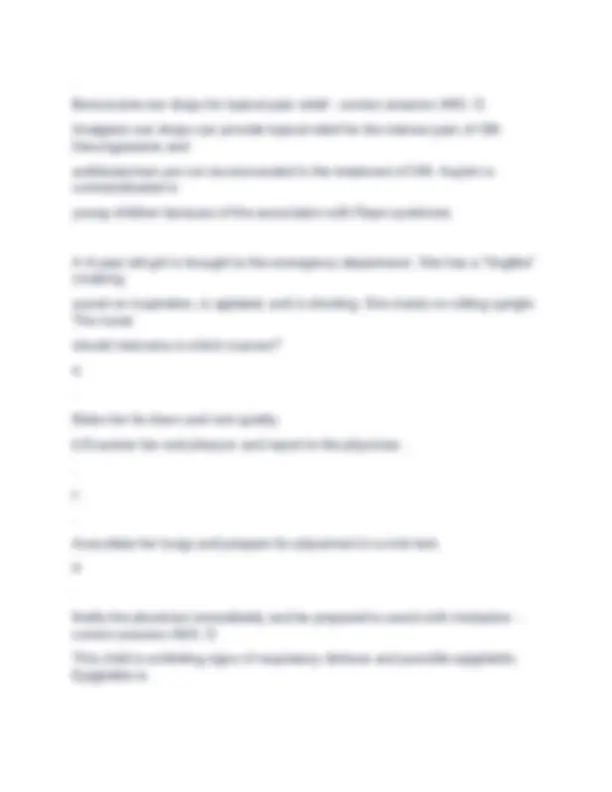

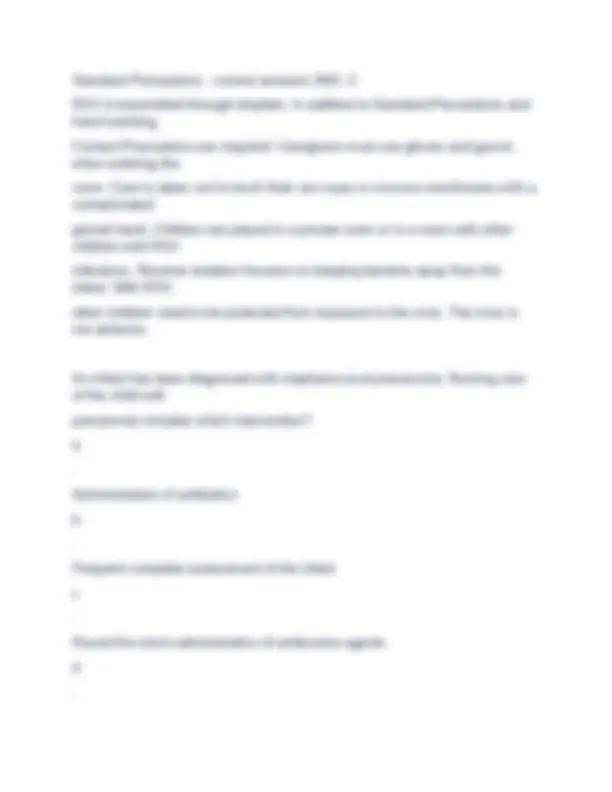
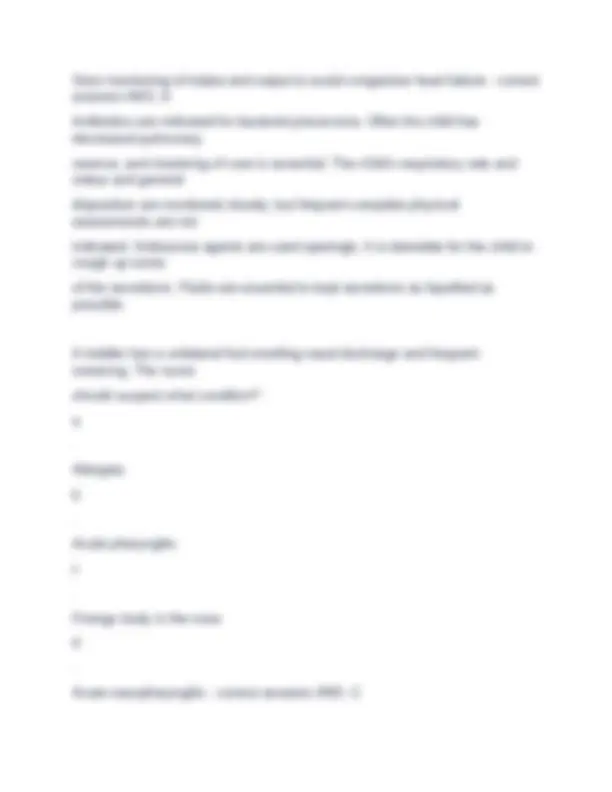
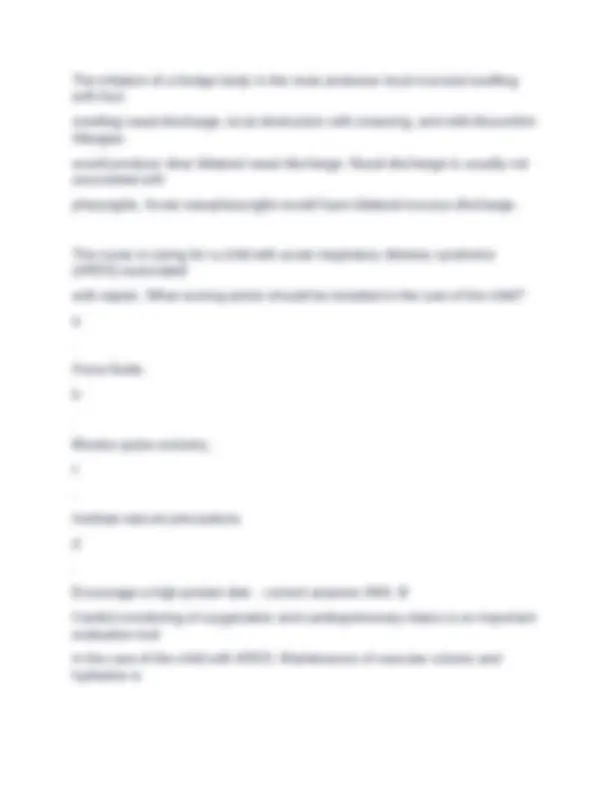
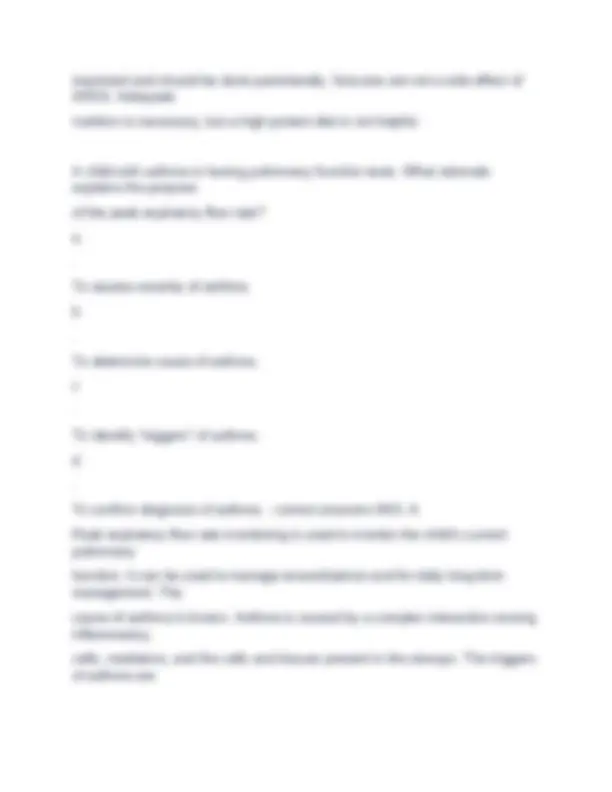
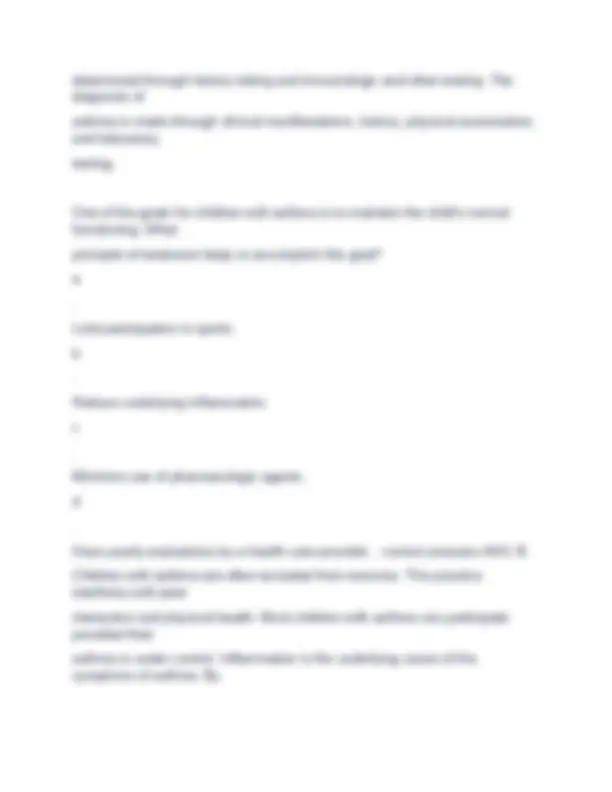
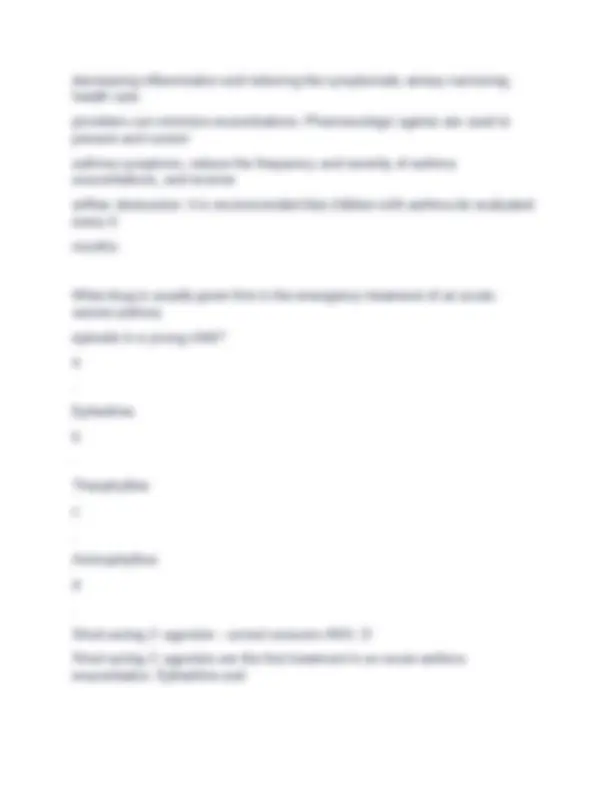
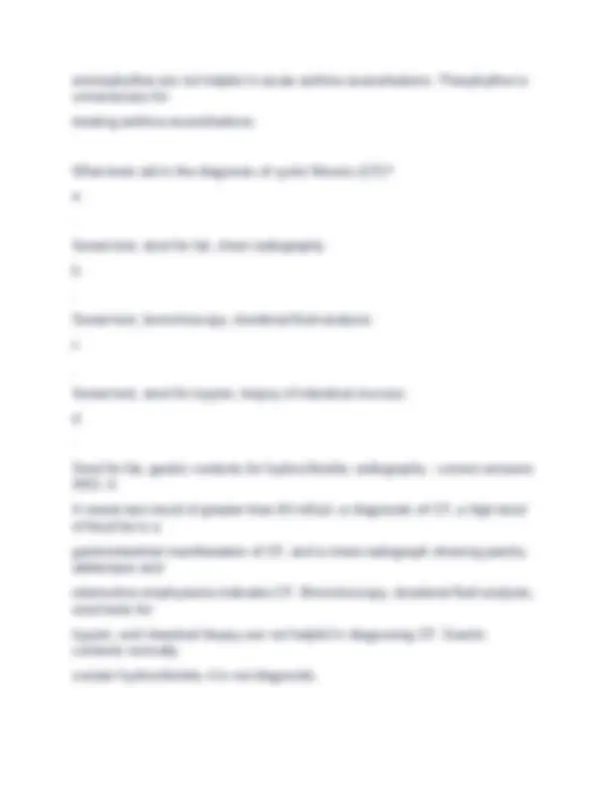
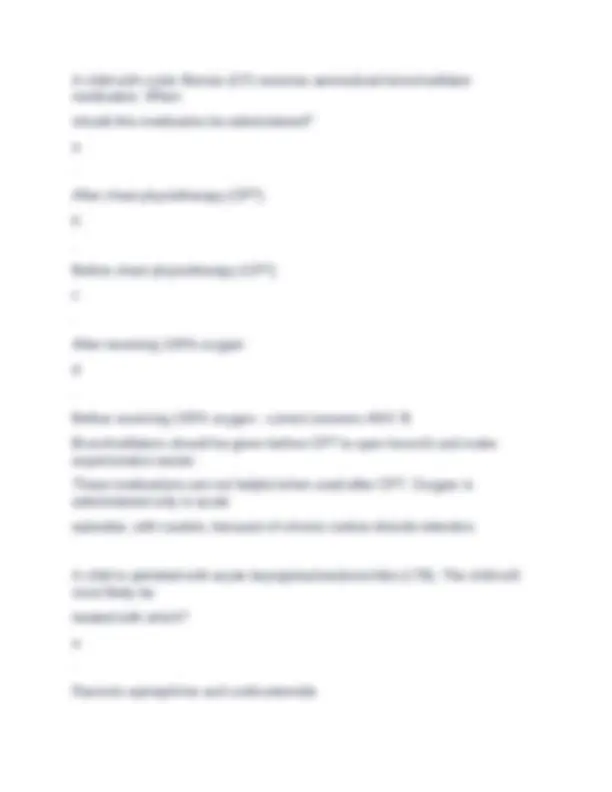
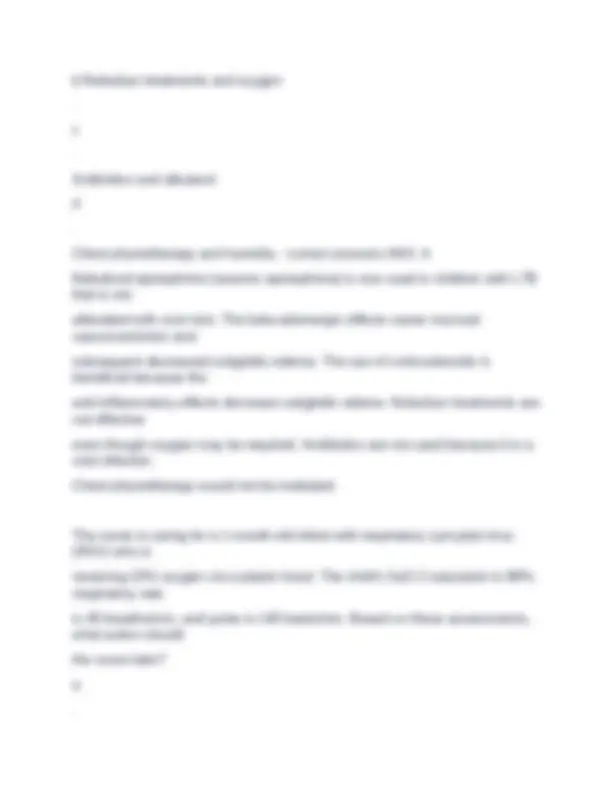
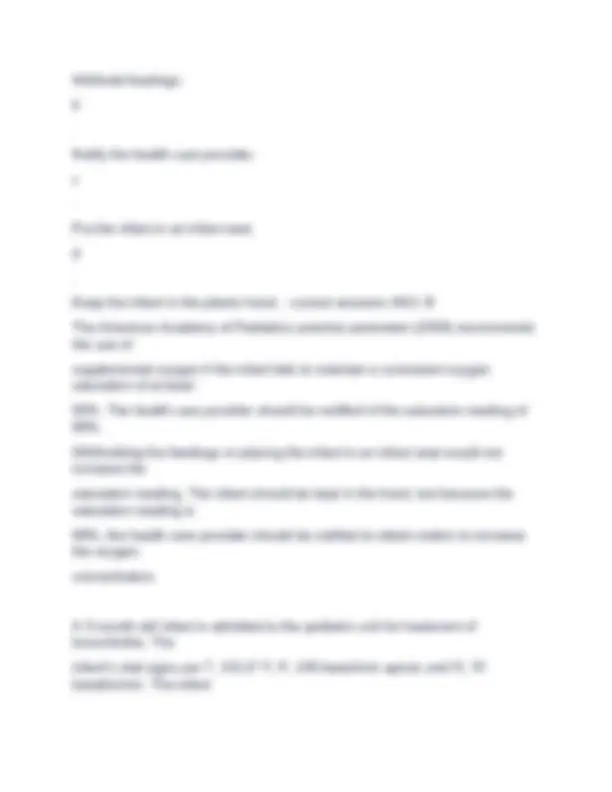

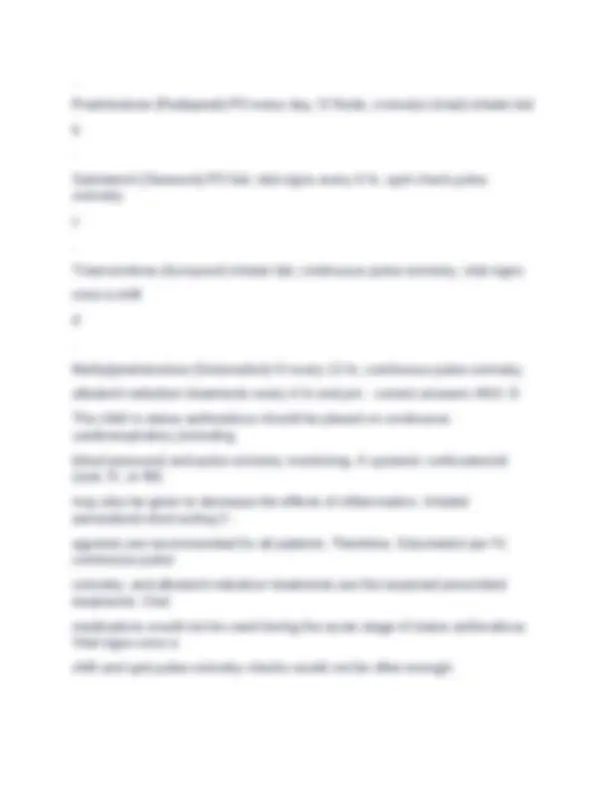


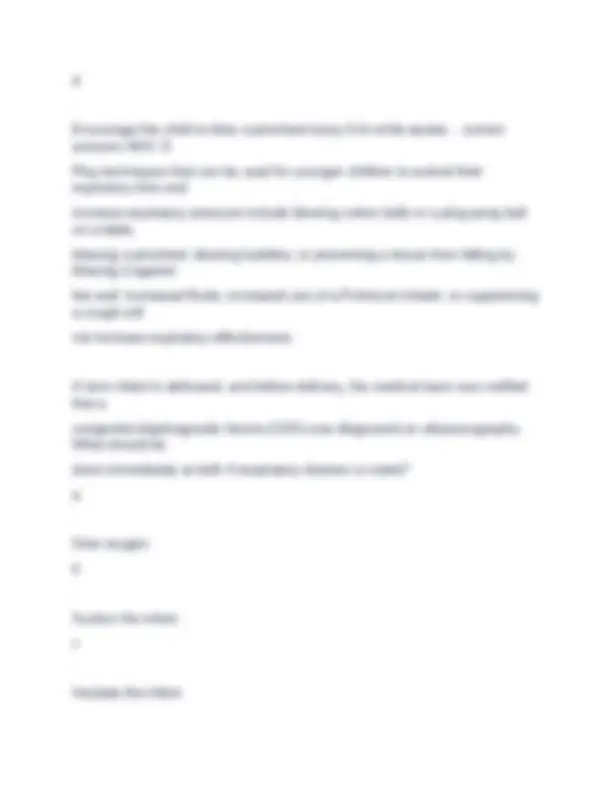
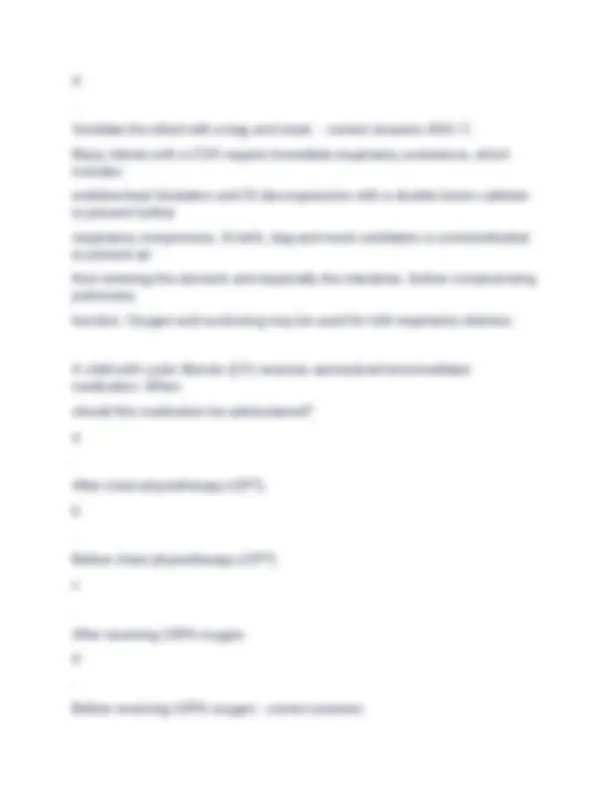




Study with the several resources on Docsity

Earn points by helping other students or get them with a premium plan


Prepare for your exams
Study with the several resources on Docsity

Earn points to download
Earn points by helping other students or get them with a premium plan
Community
Ask the community for help and clear up your study doubts
Discover the best universities in your country according to Docsity users
Free resources
Download our free guides on studying techniques, anxiety management strategies, and thesis advice from Docsity tutors
Peds 19,20,21,22,26 Exam Question and answers already passed 2025
Typology: Exams
1 / 96

This page cannot be seen from the preview
Don't miss anything!

























































































A 16-year-old boy with a chronic illness has recently become rebellious and is taking risks such as missing doses of his medication. What should the nurse explain to his parents? a . That he needs more discipline. b . That this is a normal part of adolescence. c . That he needs more socialization with peers. d . That this is how he is asking for more parental control. - correct answers ANS: B Risk taking, rebelliousness, and lack of cooperation are normal parts of adolescence, during which young adults are establishing independence. If the parents increase the amount of discipline, he will most likely be more rebellious. More socialization with peers does not address the problem of risk-taking behavior.
What nursing intervention is most appropriate in promoting normalization in a school-age child with a chronic illness? a . Give the child as much control as possible. b . Ask the child's peer to make the child feel normal. c . Convince the child that nothing is wrong with him or her. d . Explain to parents that family rules for the child do not need to be the same as for healthy siblings. - correct answers ANS: A The school-age child who is ill may be forced into a period of dependency. To foster normalcy, the child should be given as much control as possible. It is unrealistic for one individual to make the child feel normal. The child has a chronic illness, so it would be unacceptable to convince the child that nothing is wrong. The family rules should be similar for each of the children in a family. Resentment and hostility can arise if different standards are applied to each child.
recurs in waves over time. It is usually evident in the parents, not in the child. The seriously ill child would actively participate in care. Nursing interventions should be used to minimize the pain. The parents of a child born with disabilities ask the nurse for advice about discipline. The nurse's response should be based on remembering that discipline is which? a . Essential for the child b . Not needed unless the child's behavior becomes problematic c . Best achieved with punishment for misbehavior d . Too difficult to implement with a special needs child - correct answers ANS: A Discipline is essential for the child. It provides boundaries on which she can test out her behavior and teaches her socially acceptable behaviors. The nurse should teach the parents ways to manage the child's behavior before it becomes problematic. Punishment is not effective in managing behavior.
Parents ask for help for their other children to cope with the changes in the family resulting from the special needs of their sibling. What strategy does the nurse recommend? a . Explain to the siblings that embarrassment is unhealthy. b . Encourage the parents not to expect siblings to help them care for the child with special needs. c . Provide information to the siblings about the child's condition only as requested. d . Invite the siblings to attend meetings to develop plans for the child with special
parents do not allow the child to assume responsibility for self-care of the illness. The parents prefer to remain in the role of total caregiver. The parents do not encourage the child to participate in social and educational activities. A 5-year-old child will be starting kindergarten next month. She has cerebral palsy, and it has been determined that she needs to be in a special education classroom. Her parents are tearful when telling the nurse about this and state that they did not realize her disability was so severe. What is the best interpretation of this situation? a . This is a sign the parents are in denial. b . This is a normal anticipated time of parental stress. c . The parents need to learn more about cerebral palsy. d . The parents' expectations are too high. - correct answers ANS: B Parenting a child with a chronic illness can be stressful. At certain anticipated times, parental
stress increases. One of these identified times is when the child begins school. Nurses can help parents recognize and plan interventions to work through these stressful periods. The parents are not in denial; rather, they are responding to the child's placement in school. The parents are not exhibiting signs of a remembering deficit; this is their first interaction with the school system with this child. The nurse is talking to the parent of a child with special needs. The parent has expressed worry about how to support the siblings at home. What suggestion is appropriate for the nurse to give to the parent? a . "You should help the siblings see the similarities and differences between themselves and your child with special needs." b . "You should explain that your child with special needs should be included in all activities that the siblings participate in even if they are reluctant." c . "You should give the siblings many caregiving tasks for your child with special needs so the siblings feel involved."
d . Child, family, and all professionals involved - correct answers ANS: D In the home, the family is a partner in each step of the nursing process. The family priorities should guide the planning process. Both short- and long-term goals should be outlined and agreed on by the child, family, and professionals involved. Elimination of any one of these groups can potentially create a care plan that does not meet the needs of the child and family. The nurse is planning care for a 3-year-old boy who has Down syndrome and is on continuous oxygen. He recently began walking around furniture. He is spoon fed by his parents and eats some finger foods. What goal is the most appropriate to promote normal development? a . Encourage mobility. b . Encourage assistance in self-care. c . Promote oral-motor development. d
Provide opportunities for socialization. - correct answers ANS: A A major principle for developmental support in children with complex medical issues is that it should be flexible and tailored to the individual child's abilities, interests, and needs. This child is exhibiting readiness for ambulation. It is an appropriate time to provide activities that encourage mobility, for example, longer oxygen tubing. Parents should provide decreasing amounts of assistance with self-care as he is able to develop these skills. The boy is receiving oral foods and is eating finger foods. He has acquired this skill. Mobility is a new developmental task. Opportunities for socialization should be ongoing. What is a principle of palliative care that can be included in the care of children? a . Maintenance of curative therapy b . Child and family as the unit of care c . Exclusive focus on the spiritual issues the family faces d
c . Ask the parents to find out what she is angry about. d . Encourage the parents to ignore the anger at this time. - correct answers ANS: B To school-age children, chronic illness and dying represent a loss of control. This threat to their sense of security and ego strength can be manifested by verbal uncooperativeness. The child can be viewed as impolite, insolent, and stubborn. The best intervention is to encourage children to talk about feelings and give control where possible. Verbal explanations would not be "heard" by the child. The child may not be cognizant of the anger. Ignoring the anger will not help the child gain some control over the events. A 12-year-old boy is in the final phase of dying from leukemia. He tells the nurse who is giving him opiates for pain that his grandfather is waiting for him. How should the nurse interpret this situation? a . The boy is experiencing side effects of the opiates. b .
The boy is making an attempt to comfort his parents. c . He is experiencing hallucinations resulting from brain anoxia. d . He is demonstrating readiness and acceptance that death is near. - correct answers ANS: D Near the time of death, many children experience visions of "angels" or people and talk with them. The children mention that they are not afraid and that someone is waiting for them. If the child has built a tolerance to the opioids, side effects are not likely. At this time, many children do begin to comfort their families and tell them that they are not afraid and are ready to die, but the visions usually precede this stage. There is no evidence of tissue hypoxia. The nurse is making a home visit 48 hr after the death of an infant from sudden infant death syndrome (SIDS). What intervention is an appropriate objective for this visit? a . Give contraceptive information. b . Provide information on the grief process.
c . With a hospice patient who dies at home d . With the victim of a motor vehicle collision - correct answers ANS: A Autopsy is usually required in cases of unexplained death, violent death, or suspected suicide. In other instances it may be optional, and parents should be informed. The cause of death is not unknown in a person with a known terminal illness, a hospice patient at home, or a victim of a motor vehicle collision. Autopsy can be requested by family, but it is not required. The nurse is providing support to a family that is experiencing anticipatory grief related to their child's imminent death. What statement by the nurse is therapeutic? a . "Your other children need you to be strong." b . "You have been through a very tough time." c . "His suffering is over; you should be happy." d
"God never gives us more than we can handle." - correct answers ANS: B Acknowledging that the family has been through a very tough time validates the loss that the parents have experienced. It is nonjudgmental. After the death of a child, the parent recognizes the responsibilities to the rest of the family but needs to be able to experience the grief of the loss. Telling the parents what they should do is giving advice. The parent would not be happy that the child has died, and stating so is argumentative. The parents may be angry with God, or their religious beliefs may be unknown, so the nurse should not provide false reassurance by talking to them about God. How might the quality of life for a terminally ill child and his family be enhanced by nurses? a . Tell the family what is best. b . Leave the family alone to deal with their tragedy. c . Remain objective and uninvolved with family grieving. d
It is inappropriate because it is unprofessional. c . It is proper because families expect this expression of concern. d . It is appropriate because it can assist in the resolution of personal grief. - correct answers ANS: D Some nurses find shared remembrance rituals useful in resolving grief. Attending funeral services can be a supportive act for both the family and the nurse. Burnout is a state of physical, emotional, and mental exhaustion. It results from prolonged involvement with individuals in situations that are emotionally demanding. Attending the funeral of a child can be an effective coping measure. Attending funerals does not detract from the professionalism of care. Although it is important to consider the family's expectations, the act of attending the funeral provides a sense of closure with the family and facilitates the grief process for the nurse. Parents tell the nurse they do not want to let their school-age child know his illness is terminal. What response should the nurse make to the parents? a .
"Have you discussed this with your health care provider?" b . "I would do the same thing in your position; it is better the child doesn't know." c . "I understand you want to protect your child, but often children realize the seriousness of their illness." d . "I praise you for that decision; it can be so difficult to be truthful about the seriousness of your son's illness." - correct answers ANS: C Terminally ill children develop an awareness of the seriousness of their diagnosis even when protected from the truth. Acknowledging parents feelings but giving them truthful information is the appropriate response. Asking about discussing this with the health care provider is avoiding the issue. Sharing your own feelings by stating "I would do the same thing" and giving praise for the decision is nontherapeutic. When communicating with dying children, what should the nurse remember? a . Adolescent children tend to be concrete thinkers. b